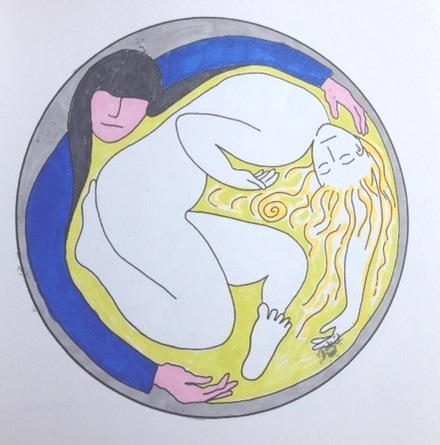|
2/12/2017 2 Comments Am I the body?'The jnani does not think he is the body. He does not even see the body. He sees only the Self in the body. If the body is not there, but only the Self, the question of its disappearing in any form does not arise.' Over this past year my body changed quite dramatically. I have had biopsies and bruising, a breast removed, a slice of flesh removed from one inner thigh and moulded into the shape and place of the old breast, this flesh dying three days later, being removed and an implant put in its place. (You can read the back story to this first here) Perhaps I am unusual in that, mostly due to the practice of yoga, I’ve liked my body for the past fifteen or so years. It is interesting dealing with plastic surgeons, who I associate with beauty and attempts to defy age, when what I am looking and asking for is a body as close as possible to the one I had before. And also, perhaps unusually and also fortunately, at 45 years old it is not the first time my body has been changed through illness and surgery. Twelve years ago I had a section of my right foot removed, including the little toe, fifth metatarsal and some of the muscles of the foot. This surgery not only reshaped my foot, but it reshaped my life as I was no longer able to continue as a full-time yoga teacher. The way I can now see it in hindsight, this is all excellent practice. The ancient yogis, and many of the Eastern wisdom traditions I’ve studied, speak of the importance of a good death, and some of this is our physical death but much of it is the intentional death of the ego, of who we think we are. Each crisis we go through in our life is potential preparation for both of these types of death. A crisis always invites some form of letting go. When the body is resculpted and its capacity changes, we cannot avoid looking directly into the question of whether we are the body - or not. Am I any lesser for having three pieces of my physical body removed? Am I any less alive because a few parts of me have died? And what or who, precisely, is in charge of all of this? When I came out of hospital after having had a total of 13 hours of surgery, a bid disappointment and on top of that a bad reaction to a pain medication, I was completely full of gratitude and love. Some psychologists call this ‘post-traumatic growth’ and mine is far from the only account of it’s impact (see this article for example). However getting to that point was not easy, and it can go the other way for some. It required a grieving of the part of the body that was lost, a readjustment of the idea of who I was, and a deeper humility as my pride took another knock as it was shown it was far from being in charge of my destiny. It also required a letting go of old patterns – I watched as my mind attempted to move into blame and self-pity, but, from many years of meditation, knowing that those old patterns simply weren’t going to work the only option that remained was to face and be with the pain, disappointment and sadness. It was excruciatingly hard at times. But ageing and the body changing is a natural process and fighting it is like King Canute commanding the tide not to come in. As a yogi, I know and see that change is inherent in all things, and so things can and do change, often positively if we work in harmony with our nature and energies, but also sometimes in a direction that we do not want. How often do you see a straight line in nature? Most change is far from linear, more cyclic and organic in its movement. And, in my opinion, this creates far more beauty than the right angles beloved of mankind. So although I have lost some (more) physical capacity I have gained a valuable skill. I have tasted the possibility of opportunities I love shrinking away. This is where most of us will find ourselves if we are lucky enough to live to an old age, as our eyes and ears and memory and strength fail, as we are less able to fulfil society’s preference for ‘productive’ citizens. It is a taste of falling apart, a taste of not getting what you want, and facing this helps us recognise the beauty and value of this very precious life, and to remember that what is important is rarely what our society and others want us to believe.
2 Comments
|
AuthorThis blog shows the range of interests and activities that Kate delights in - and shares her news Archives
June 2022
|

 RSS Feed
RSS Feed
